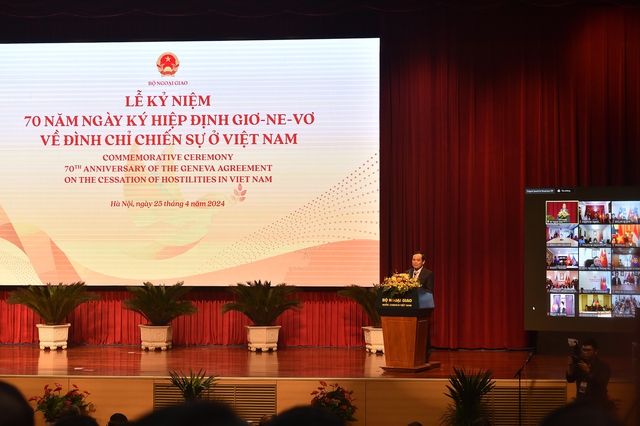Viet Nam marks 70th anniversary of Geneva Agreement
VGP - A grand ceremony was held in Ha Noi on April 25 to mark the 70th anniversary of the Geneva agreement on the cessation of hostilities in Viet Nam.

Deputy Prime Minister Tran Luu Quang addresses the commemorative ceremony on the 70th anniversary of the Geneva agreement on the cessation of hostilities in Viet Nam, Ha Noi, April 25, 2024 - Photo: VGP
President of the Vietnamese Fatherland Front Do Van Chien, Chairman of the Central Commission for External Relations Le Hoai Trung, and Deputy Prime Minister Tran Luu Quang attended the event.
Addressing the event, Deputy Prime Minister Tran Luu Quang said, the accords marked the first time in the nation's history that the fundamental national rights of Viet Nam such as independence, sovereignty, unity, and territorial integrity–had been affirmed in an international agreement, recognized and respected by the countries participating in the Geneva Conference.
It also left valuable lessons and contributed to the cultivation of numerous outstanding diplomats in the Ho Chi Minh era, he noted.
The accords also created great inspiration and encouragement for the national liberation struggle movement across five the continents, for independence, freedom, peace, democracy, progress and social justice, highlighted the Deputy PM.
The signing of the accords came as a result of the resilient struggle by the people under the leadership of the Party throughout the long resistance against colonialism, culminating in the glorious victory of Dien Bien Phu.
It was the results of significant and invaluable support from international friends, primarily from Laos, Cambodia, China, the Soviet Union, socialist countries, and peace-loving people worldwide, including French people.
In today's volatile, uncertain, complex, and ambiguous world, the commemorative ceremony creates an opportunity to review the nation's heroic history; be proud of the previous generations; and deepen the stature and significance of this especially important victory, thereby strongly upholding patriotism, national pride and aspirations and efforts, said Tran.
On July 21, 1954, the Geneva Accords were signed after 75 days of intense and complex negotiations.
The accords completely ended the colonial domination of the old imperialism that had lasted nearly 100 years in the country, ushering in a new chapter in the cause of national liberation and reunification.
It marked the establishment of socialism in the north and the launch of the democratic national revolution in the south, aiming to fully realize the goal of national independence and unity./.

